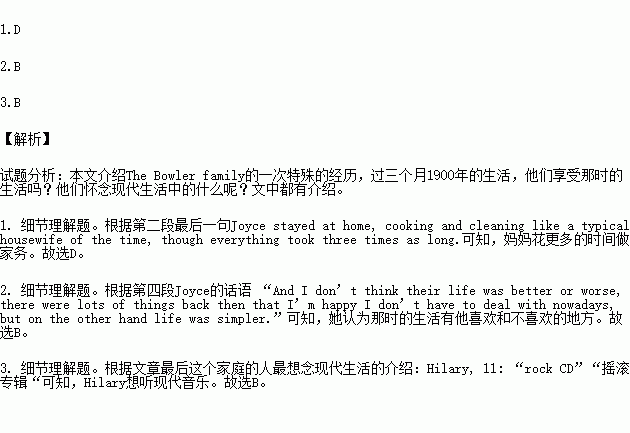题目内容
The Bowler family had a very unusual experience this year. It was one of more than 400 families who applied to 1900 house, a reality TV show which took a typical family back a hundred years to see how people lived in the days before the internet, computer games and even electricity.
The Bowler family spent three months in a London home without a telephone, computers, TV, or fast food. The bowlers wore clothes from 1900, ate only food available in England at that time, and cooked their meals on a single stove. Paul Bowler still went to work every day in a then uniform. The children changed their clothes on the way to and from school and their classmates didn’t know about their unusual home life. Joyce stayed at home, cooking and cleaning like a typical housewife of the time, though everything took three times as long.
So does Joyce think that people’s lives were better in the old days?
“I think people in the old days had just as many troubles and worries,” Joyce said. “And I don’t think their life was better or worse, there were lots of things back then that I’m happy I don’t have to deal with nowadays, but on the other hand life was simpler.” “We had a lot more time with our family, and it was hard being nice to each other all the time,” eleven-year-old Hilary said.
So what did the Bowler family miss most about modern life while living in the 1900 house?
Paul, 39: “telephone and a hot shower”
Joyce, 44: “a quick cup of tea from a kettle you could just turn on”
Hilary, 11: “rock CD”
Joseph, 9: “hamburger and computer games”
1.While the Bowler family was living in 1900 house, ________.
A. the two children wore the then clothes for school
B. they prepared their meals together on a stove
C. they ate simple foods they had never seen
D. the mother spent more time on housework
2.According to Paragraph 4, what’s Joyce’s opinion about life in 1900?
A. Life was simpler but worse than it is now.
B. There were things she liked and disliked.
C. The family had more time to stay together.
D. There were fewer problems for the family.
3.What would Hilary expect most from modern life in the three months?
A. To make phone calls.B. To listen to music.
C. To chat on the Internet.D. To play computer games.
 阅读快车系列答案
阅读快车系列答案





